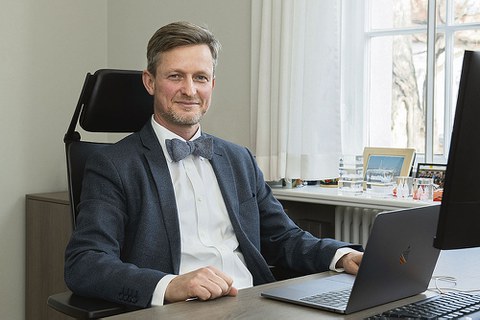04.05.2021
Frischer Wind auf einem »großen Tanker«

Kanzler Dr. Andreas Handschuh.
Rektorin und Kanzler initiieren mit sieben Themenzirkeln die Diskussion über attraktive Arbeitsbedingungen und die TUD als lernende Organisation
Magdalena Selbig
Begeistert zeigte sich Rektorin Prof. Ursula M. Staudinger vom Zukunftslabor am 24. März, das sich um die TU Dresden als moderne und lernende Organisation drehte. Proaktive Veränderungen seien der Schlüssel für innovative Ideen auf diesem 40 000 Personen umfassenden »großen Tanker« TU Dresden, der gleichzeitig Dresdens größte Arbeitgeberin ist. Kanzler Dr. Andreas Handschuh resümierte die Bedarfe seit den Zukunftslaboren 2018: »Eine Optimierung unserer Prozesse konnten wir etwa durch die Digitalisierung der Einstellungsvorgänge für SHKs und WHKs auf den Weg bringen. Die neue Technologie FIORI wird digitale Urlaubsanträge ermöglichen. Auch befördern Dienstvereinbarungen zur flexiblen Arbeitszeit und, in absehbarer Zeit, zur mobilen Arbeit die Vereinbarkeit von Arbeit und Privatleben. Angesichts der wachsenden Komplexität müssen wir aber unsere Prozesse immer wieder anpassen, um serviceorientiert und wettbewerbsfähig zu bleiben. Gleichzeitig wollen wir unsere Mitarbeiter und Mitarbeiterinnen nicht überlasten und zur Nutzung neuer Tools befähigen.« Learning by doing neben dem »Tagesgeschäft« sei keine Lösung. Beide Rektoratsmitglieder sind sich einig: »Wir müssen ein digitales, schlankes und lösungsorientiertes Verwaltungsmanagement voranbringen.« Die abschließende Publikumsfrage war grundständig: Was bedeutet die neue Matrixstruktur im erweiterten Rektorat? Die Rektorin brachte es auf den Punkt: »In der Matrixstruktur werden zu erledigende Aufgaben über die etablierten Dezernatsgrenzen hinaus aufgabenorientiert verteilt.« Im Anschluss wurden die sieben Themenzirkel eröffnet, von drei ausgewählten soll folgend berichtet werden.
Themenzirkel vier adressierte die Möglichkeiten für Anreizsysteme. Prof. Rolf Koerber (apl. Professur im Fach Wirtschaft, Technik, Haushalt/Soziales) und Kathleen Fischer (Leiterin Grundsatz- und Rechtsangelegenheiten im Dezernat Personal) eröffneten die Runde mit einer Übersicht über bestehende Leistungsanreize an der TU Dresden, die lebhaft diskutiert wurden. So erklärte Evelyn Ernst, auch Mitglied im Personalrat: »Entfristung, Lob und Weiterbildungen sind Grundlagen und in der Wirtschaft selbstverständlich. Ich höre oft von fehlendem Vertrauen, was ein klares Thema der Führungskompetenz ist.« Stellenperspektiven, wertschätzende Worte und Feedbackkultur jenseits der Jahresgespräche waren weitere Anliegen der Gesprächsrunde. Ebenso wichtig seien individuell passende Arbeitsinhalte und die Gelegenheit, eigene Wünsche offen anzusprechen. Als problematisch erachtet wurden die bürokratischen Hürden für internationale Wissenschaftler:innen. Dazu meinte Maria Richter-Babekoff (Referentin für Internationales im Bereich Mathematik und Naturwissenschaften): »Man sollte Verwaltungsmitarbeiter:innen, die für Internationales zuständig sind, animieren, sich den Belangen der Menschen aus anderen Kulturen zu öffnen, indem man ihnen zum Beispiel ein Prädikat ›kultursensibles Administrieren‹ verleiht. « Tenor in diesem Themenzirkel blieb die Notwendigkeit, Perspektiven und planbare Entwicklungen im Sinne der Arbeitnehmer zu schaffen.
Carolin Spittler und Dr. Steffen Herzog vom Personaldezernat führten durch den Themenzirkel fünf, der Impulse zum Personalmanagement zusammentrug. Relevant war hier das Verständnis des Dezernats als Serviceanbieter: Administrative Fachsprache müsse durch Mitarbeiterschulungen abgebaut werden. Dieser Ansatz knüpfte an den Wunsch nach einer hauseigenen Weiterbildungspraxis an. Pascal Hoff vom Zentrum für sozialwissenschaftliche Methoden merkte an, dass ein Dezernats-Helpdesk als erste Vermittlungsstelle hilfreich sei. In Hinblick auf den Fachkräftemangel betonte Ronny Petzold (Gruppenleiter Sachgebiet Studienangelegenheiten), wie entscheidend schnellere Einstellungsverfahren, unbefristete Stellenangebote und angemessenes Marketing zur Akquise neuer Mitarbeiterinnen und Mitarbeiter seien. Dieser Punkt führe zum Wissenstransfer zwischen erfahrenem und neuem Personal: »Ohne Parallelität und Einarbeitung entsteht ein schmerzhafter Wissensverlust«, sagte Kathrin Brömmer (Sachgebietsleiterin Infrastrukturelles Gebäudemanagement und Umweltmanagementbeauftragte). »Ich werbe für ein Kontingent, damit beide Personen ein bis zwei Monate gemeinsam beschäftigt werden.« Führungsverantwortliche stünden zudem häufig vor der Herausforderung, ihren Betreuerpflichten ohne Anleitung nachzukommen. Dr. Fabian Paulus (Forschungsgruppenleiter am cfaed) regte daher ein Grundlagendokument der Personalabteilung an.
Im Themenzirkel Nummer sechs erörterten die Teilnehmenden mit Dr. Barbara Könczcöl (Geschäftsstellenleiterin der Graduiertenakademie) und Dr. Mathias Kuhnt (Zentrum für sozialwissenschaftliche Methoden) Laufbahnmodelle für Nachwuchswissenschaftler: innen in der Qualifizierungsphase. Hier wurde der Wunsch nach regelmäßigen Gesprächen bezüglich der Karriereperspektiven sowie der Wunsch nach (Fach)Mentor: innen geäußert. Daneben stand das Problem der Stellenbefristungen im Raum. Django Adam von der Professur für Verkehrsleitsysteme und -prozessautomatisierung äußerte: »Manche Kollegen gehen seit 24 Jahren von Befristung zu Befristung, obwohl ihre Lehrexpertise unabdingbar ist. Das halte ich für einen prekären Zustand, der die Qualität und die nachhaltige Entwicklung der exzellenten Lehre torpediert.« Ein pragmatisches Resümee zog Dr. Uta Bilow (Leiterin der Arbeitsgruppe Wissenschaftsvermittlung am Institut für Kern- und Teilchenphysik): »Es gibt dauerhafte Beschäftigungen. Strategisch bedarf es jedoch Beratungsangebote für andere Laufbahnen und einer anschließenden Unterstützung derjenigen, die sich dafür interessieren. Promovierende sollten aus den Befristungen herausgerechnet werden – nur wer weiterbeschäftigt wird, ist Teil einer belastbaren Zahl hinsichtlich Kettenbefristungen.« Stark nachgefragt war das Konzept reiner Lehrstellen. Dr. Paulus pointierte: »Lecture-Stellen sind attraktiv und viele Promovierende ausgesprochen talentiert in der Lehre. Außerdem würde es die Professoren zwischen Betreuung, Führung, Forschung und Verwaltung entlasten. Als zweiter Weg anstelle der Professur ist das eine echte Alternative.« Mit diesem Duett aus Entfristung und Beschäftigungsfeldern endete der Themenzirkel.
Final dankte Professorin Staudinger allen Beteiligten für die vielfältigen Gestaltungsideen und schloss die Veranstaltung mit dem Ausblick auf die Umsetzung der Impulse.
Informationen zu den Schwerpunkten und Moderator:innen der Themenzirkel »Wie bleiben wir innovativ?«, »Wie sichern und teilen wir Wissen innerhalb der Organisation?«, »Wie können wir mit Hilfe von Daten unsere Organisation entwickeln und steuern?« und »Wie wollen wir die Arbeitsumgebungen an der Universität gestalten?« finden sich unter https://tud.link/nlmk.
Dieser Artikel ist im Dresdner Universitätsjournal 08/2021 vom 4. Mai 2021 erschienen. Die komplette Ausgabe ist im Online-Auftritt des UJ unter https://tu-dresden.de/uj oder hier im pdf-Format kostenlos downloadbar. Das UJ kann als gedruckte Zeitung oder als pdf-Datei bei bestellt werden.
